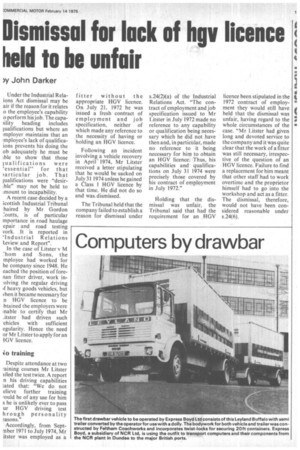Dismissal for lack of hgv licence kid to be unfair
Page 17

If you've noticed an error in this article please click here to report it so we can fix it.
)■,/ John Darker
Under the Industrial Rela ions Act dismissal may be air if the reason for it relates o the employee's capability o perform his job. The capa heading includes ivalifications but where an :mployer maintains that an .mployee's lack of qualificaions prevents his doing the ob adequately he must be :ble to show that those ivalifications were 'essential" for that 'articular job. That tualifications were "desir:ble" may not be held to :mount to incapability.
A recent case decided by a Icottish Industrial Tribunal haired by Mr Gordon :mitts, is of particular mportance in road haulage epair and road testing vork. It is reported in 'Industrial Relations teview and Report".
In the case of Litster v M
-horn and Sons, the mployee had worked for he company since 1948. He eached the position of foreaan fitter driver, work inolving the regular driving if heavy goods vehicles, but vhen it became necessary for
n HGV licence to be
btained the employers were Inable to certify that Mr .,itster had driven such .ehieles with sufficient egularity. Hence the need or Mr Litster to apply for an IGV licence.
in training
Despite attendance at two -aining courses Mr Litster tiled the test twice. A report n his driving capabilities tated that: "We do not el ieve further training ,ould be of any use for him s he is unlikely ever to pass ur HGV driving test hrough personality !asons."
Accordingly, from Sept-nber 1971 to July 1974, Mr itster was employed as a fitter without the appropriate HGV licence. On July 21, 1972 he was issued a fresh contract of employment and job specification, neither of which made any reference to the necessity of having or holding an HGV licence.
Following an incident involving a vehicle recovery in April 1974, Mr Litster received a letter stipulating that he would be sacked on July 31 1974 unless he gained ' a Class 1 HGV licence by that time. He did not do so and was. dismissed.
The Tribunal held that the company failed to establish a reason for dismissal under s.24(2)(a) of the Industrial Relations Act. "The contract of employment and job specification issued to Mr Litster in July 1972 made no reference to any capability or qualification being necessary which he did not have then and, in particular, made no reference to it being necessary for him to obtain an HGV licence. Thus, his capabilities and qualifications on July 31 1974 were precisely those covered by his contract of employment in July 1972."
holding that the dismissal was unfair, the Tribunal said that had the requirement for an HGV licence been stipulated in the 1972 contract of employment they would still have held that the dismissal was unfair, having regard to the whole circumstances of the case. "Mr Litster had given long and devoted service to the company and it was quite clear that the work of a fitter was still necessary, irrespective of the question of an HGV licence. Failure to find a replacement for him meant that other staff had to work overtime and the proprietor himself had to go into the workshop and act as a fitter. The dismissal, therefore, would not have been considered reasonable under s.24(6).




































































































